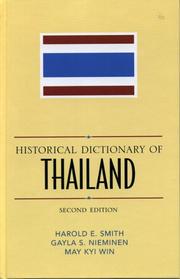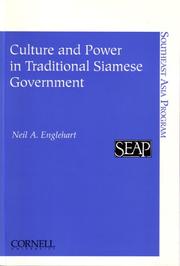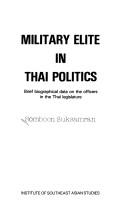| Listing 1 - 10 of 88 | << page >> |
Sort by
|

ISBN: 0810853965 Year: 2005 Volume: 55 Publisher: Lanham Scarecrow
Abstract | Keywords | Export | Availability | Bookmark
 Loading...
Loading...Choose an application
- Reference Manager
- EndNote
- RefWorks (Direct export to RefWorks)
908 <593> --- Heemkunde. Area studies--Thailand --- 908 <593> Heemkunde. Area studies--Thailand --- Thailand --- Tʻai-kuo --- Hsien-lo --- Muang-Thai --- Thaimaa --- Prates Thai --- Prades Thai --- Thaïlande --- Kingdom of Thailand --- Prathēt Thai --- Tailand --- Thailandia --- Thajsko --- Royal Thai Government --- Ratcha Anachak Thai --- Koninkryk van Thailand --- تايلاند --- Tāylānd --- Tailandia --- Reino de Tailandia --- Tayilande --- Royômo de Tayilande --- Tayland Krallığı --- Pratet Tai --- Thài-kok --- Тайланд --- Каралеўства Тайланд --- Karaleŭstva Taĭland --- Tailandya --- Tajland --- Kraljevina Tajland --- Кралство Тайланд --- Kralstvo Taĭland --- Siam --- History
Book
Abstract | Keywords | Export | Availability | Bookmark
 Loading...
Loading...Choose an application
- Reference Manager
- EndNote
- RefWorks (Direct export to RefWorks)
Thailand. --- Tʻai-kuo --- Hsien-lo --- Muang-Thai --- Thaimaa --- Prates Thai --- Prades Thai --- Thaïlande --- Kingdom of Thailand --- Prathēt Thai --- Tailand --- Thailandia --- Thajsko --- Royal Thai Government --- Ratcha Anachak Thai --- Koninkryk van Thailand --- تايلاند --- Tāylānd --- Tailandia --- Reino de Tailandia --- Tayilande --- Royômo de Tayilande --- Tayland Krallığı --- Pratet Tai --- Thài-kok --- Тайланд --- Каралеўства Тайланд --- Karaleŭstva Taĭland --- Tailandya --- Tajland --- Kraljevina Tajland --- Кралство Тайланд --- Kralstvo Taĭland --- Siam
Book
ISBN: 9074104126 Year: 1993 Publisher: Brussels European Institute for South and South-East Asian studies
Abstract | Keywords | Export | Availability | Bookmark
 Loading...
Loading...Choose an application
- Reference Manager
- EndNote
- RefWorks (Direct export to RefWorks)
Conferences - Meetings --- Thailand --- Tʻai-kuo --- Hsien-lo --- Muang-Thai --- Thaimaa --- Prates Thai --- Prades Thai --- Thaïlande --- Kingdom of Thailand --- Prathēt Thai --- Tailand --- Thailandia --- Thajsko --- Royal Thai Government --- Ratcha Anachak Thai --- Koninkryk van Thailand --- تايلاند --- Tāylānd --- Tailandia --- Reino de Tailandia --- Tayilande --- Royômo de Tayilande --- Tayland Krallığı --- Pratet Tai --- Thài-kok --- Тайланд --- Каралеўства Тайланд --- Karaleŭstva Taĭland --- Tailandya --- Tajland --- Kraljevina Tajland --- Кралство Тайланд --- Kralstvo Taĭland --- Siam --- Economic conditions --- Congresses. --- Foreign relations --- Politics and government --- Social conditions
Periodical
ISSN: 26659077 Year: 1998 Publisher: [Bangkok] : Leiden : [Chulalongkorn University] Brill
Abstract | Keywords | Export | Availability | Bookmark
 Loading...
Loading...Choose an application
- Reference Manager
- EndNote
- RefWorks (Direct export to RefWorks)
Humanities --- Humanities. --- Thailand. --- Learning and scholarship --- Classical education --- Hsien-lo --- Karaleŭstva Taĭland --- Kingdom of Thailand --- Koninkryk van Thailand --- Kraljevina Tajland --- Kralstvo Taĭland --- Muang-Thai --- Prades Thai --- Prates Thai --- Pratet Tai --- Prathēt Thai --- Ratcha Anachak Thai --- Reino de Tailandia --- Royal Thai Government --- Royômo de Tayilande --- Tʻai-kuo --- Tailand --- Tailandia --- Tailandya --- Tajland --- Tayilande --- Tāylānd --- Tayland Krallığı --- Thài-kok --- Thaïlande --- Thailandia --- Thaimaa --- Thajsko --- Academies & Learned Societies Publications

ISBN: 1501719114 9781501719110 0877271356 9780877271352 Year: 2018 Publisher: Ithaca, NY
Abstract | Keywords | Export | Availability | Bookmark
 Loading...
Loading...Choose an application
- Reference Manager
- EndNote
- RefWorks (Direct export to RefWorks)
A broad reevaluation of Siam's political culture as it existed prior to King Chulalongkorn's administrative reforms in the nineteenth century. Englehart offers evidence to show that traditional Siamese government functioned more effectively and rationally than most scholars have acknowledged.
Political culture --- Culture --- Political science --- Thailand --- Tʻai-kuo --- Hsien-lo --- Muang-Thai --- Thaimaa --- Prates Thai --- Prades Thai --- Thaïlande --- Kingdom of Thailand --- Prathēt Thai --- Tailand --- Thailandia --- Thajsko --- Royal Thai Government --- Ratcha Anachak Thai --- Koninkryk van Thailand --- تايلاند --- Tāylānd --- Tailandia --- Reino de Tailandia --- Tayilande --- Royômo de Tayilande --- Tayland Krallığı --- Pratet Tai --- Thài-kok --- Тайланд --- Каралеўства Тайланд --- Karaleŭstva Taĭland --- Tailandya --- Tajland --- Kraljevina Tajland --- Кралство Тайланд --- Kralstvo Taĭland --- Siam --- Politics and government
Book
ISBN: 9814762385 9814762377 Year: 2016 Publisher: Singapore : ISEAS-Yusof Ishak Institute,
Abstract | Keywords | Export | Availability | Bookmark
 Loading...
Loading...Choose an application
- Reference Manager
- EndNote
- RefWorks (Direct export to RefWorks)
Thailand's political impasse in the past decade is partly attributable to the royalist dominance of the parliamentary system, a dominance developed and strengthened under the cultural condition of hyper-royalism. Hyper-royalism is the politico-cultural condition in which royalism is intensified and exaggerated in public and everyday life. It is sanctioned by legislation that controls expressions about the monarchy in the public sphere. Hyper-royalism began in the mid-1970s as a measure to counteract perceived communist threats. Despite the fact that these threats had disappeared by the early 1980s, hyper-royalism persisted and was strengthened to support royalist democracy. Hyper-royalism generates the concept of the ideology of modern monarchy -- a charismatic king who is sacred, righteous and cares for his people, and who is indispensable to Thailand -- and the belief that royalist democracy is best for Thailand. Hyper-royalism also generates the illusion that the monarchy is divine, thanks to visual performances and objects, especially through television and majestic pageantry. Accordingly, the ideal monarch is found in King Bhumibol. Given the mortality of Bhumibol, however, future prospects of hyper-royalism and royalist-guided democracy are grim. Thailand's political future is highly uncertain.
Monarchy --- Monarchy, Thai --- Thai monarchy --- Thailand --- Tʻai-kuo --- Hsien-lo --- Muang-Thai --- Thaimaa --- Prates Thai --- Prades Thai --- Thaïlande --- Kingdom of Thailand --- Prathēt Thai --- Tailand --- Thailandia --- Thajsko --- Royal Thai Government --- Ratcha Anachak Thai --- Koninkryk van Thailand --- تايلاند --- Tāylānd --- Tailandia --- Reino de Tailandia --- Tayilande --- Royômo de Tayilande --- Tayland Krallığı --- Pratet Tai --- Thài-kok --- Тайланд --- Каралеўства Тайланд --- Karaleŭstva Taĭland --- Tailandya --- Tajland --- Kraljevina Tajland --- Кралство Тайланд --- Kralstvo Taĭland --- Siam --- Politics and government

ISBN: 981434558X 9971902494 Year: 1984 Publisher: Singapore : Institute of Southeast Asian Studies,
Abstract | Keywords | Export | Availability | Bookmark
 Loading...
Loading...Choose an application
- Reference Manager
- EndNote
- RefWorks (Direct export to RefWorks)
This compilation of biographical data on the military officers in the National Administrative Reform Assembly (1976-77), the National Legislative Assembly, and/or the Senate (1979 to the present) is meant to provide base-line data for further study of military intervention in Thai politics. It also provides the officers' social background, military rank and position at the time they were appointed to their political positions.
Thailand. --- Thailand --- Tʻai-kuo --- Hsien-lo --- Muang-Thai --- Thaimaa --- Prates Thai --- Prades Thai --- Thaïlande --- Kingdom of Thailand --- Prathēt Thai --- Tailand --- Thailandia --- Thajsko --- Royal Thai Government --- Ratcha Anachak Thai --- Koninkryk van Thailand --- تايلاند --- Tāylānd --- Tailandia --- Reino de Tailandia --- Tayilande --- Royômo de Tayilande --- Tayland Krallığı --- Pratet Tai --- Thài-kok --- Тайланд --- Каралеўства Тайланд --- Karaleŭstva Taĭland --- Tailandya --- Tajland --- Kraljevina Tajland --- Кралство Тайланд --- Kralstvo Taĭland --- Siam --- Armed Forces --- Officers --- Political activity. --- POLITICAL SCIENCE / Political Process / General.
Book
ISBN: 9814459615 9814459607 Year: 2014 Publisher: Singapore : Institute of Southeast Asian Studies,
Abstract | Keywords | Export | Availability | Bookmark
 Loading...
Loading...Choose an application
- Reference Manager
- EndNote
- RefWorks (Direct export to RefWorks)
What did the 2006 military coup show us? It demonstrated that the crux of the Thai crisis is far more serious and much wider in scope than had previously been thought. The monarchy is surely not a victim in the protracted conflict, but the root cause and continuing factor that has eroded Thai politics. The coup set in motion more prejudicial uses of the lèse-majesté law, and in the process, has led to more political prisoners. It has also shredded the military into several segments, turning generals into desperate royalists who continue to live off the monarchy in order to survive. Issues of violence in the Thai south and the Thai-Cambodian dispute became greatly intensified in the age of militarized politics. The coup also produced unique colour-coded politics and created crises of legitimacy. This book is a collection of essays that reflect developments in Thai politics in the post-coup period.
POLITICAL SCIENCE / American Government / General. --- Thailand --- Tʻai-kuo --- Hsien-lo --- Muang-Thai --- Thaimaa --- Prates Thai --- Prades Thai --- Thaïlande --- Kingdom of Thailand --- Prathēt Thai --- Tailand --- Thailandia --- Thajsko --- Royal Thai Government --- Ratcha Anachak Thai --- Koninkryk van Thailand --- تايلاند --- Tāylānd --- Tailandia --- Reino de Tailandia --- Tayilande --- Royômo de Tayilande --- Tayland Krallığı --- Pratet Tai --- Thài-kok --- Тайланд --- Каралеўства Тайланд --- Karaleŭstva Taĭland --- Tailandya --- Tajland --- Kraljevina Tajland --- Кралство Тайланд --- Kralstvo Taĭland --- Siam --- History --- Politics and government --- Government. --- Political Science.
Book
ISBN: 1626375143 1626374279 Year: 2016 Publisher: Boulder, Colorado ; London, [England] : Lynne Rienner Publishers,
Abstract | Keywords | Export | Availability | Bookmark
 Loading...
Loading...Choose an application
- Reference Manager
- EndNote
- RefWorks (Direct export to RefWorks)
The prospects for Thailand's emergence as a democracy seemed strong in the 1990s. Yet, as most recently demonstrated by military coups in 2006 and 2014, that hasn't happened. Why not? Why have factors typically considered advantageous for democratization turned into barriers? Is there a uniquely Thai reason that democratization efforts have failed? Daniel Unger and Chandra Mahakanjana explore the intersecting and often contradictory forces that are shaping the nature of Thai politics today. Paying overdue attention to a complex of social, cultural, and institutional dynamics, they offer a nuan
Democratization --- Democratic consolidation --- Democratic transition --- Political science --- New democracies --- Thailand --- Tʻai-kuo --- Hsien-lo --- Muang-Thai --- Thaimaa --- Prates Thai --- Prades Thai --- Thaïlande --- Kingdom of Thailand --- Prathēt Thai --- Tailand --- Thailandia --- Thajsko --- Royal Thai Government --- Ratcha Anachak Thai --- Koninkryk van Thailand --- تايلاند --- Tāylānd --- Tailandia --- Reino de Tailandia --- Tayilande --- Royômo de Tayilande --- Tayland Krallığı --- Pratet Tai --- Thài-kok --- Тайланд --- Каралеўства Тайланд --- Karaleŭstva Taĭland --- Tailandya --- Tajland --- Kraljevina Tajland --- Кралство Тайланд --- Kralstvo Taĭland --- Siam --- Politics and government
Book
ISBN: 1785276263 1785276271 1785276255 Year: 2021 Publisher: London, England : Anthem Press,
Abstract | Keywords | Export | Availability | Bookmark
 Loading...
Loading...Choose an application
- Reference Manager
- EndNote
- RefWorks (Direct export to RefWorks)
This book presents the very first analysis of male homosexuality in modern rural Thailand that is based on sociological/anthropological research directly with 25 young same-sex attracted men. It explores changes in the way men view and describe their sexuality over time by interviewing them three times over a period of around 18 months. The men are followed during an important transition in their lives: the end of their high school years and the end (in most cases) of their life as a child with parents or extended family at a rural home. Nearly all decided to move to a city to continue their education or to find work. Some also had stints with sex work in one of Thailand's well-known centers for prostitution. For nearly all men, this transition brought them into contact with new ideas about gender and sexuality, and many experienced an abrupt increase in their opportunities to have sex, leading to a readjustment of their moral universes. The book presents significant new insights about the Thai sex/gender system, particularly on how it is affected by processes of globalization and the ascent of the Internet and mobile phones as tools for dating and romance.
Homosexuality --- Same-sex attraction --- Sexual orientation --- Bisexuality --- Young gay men --- Social conditions. --- Gay young men --- Gay men --- Thailand. --- Hsien-lo --- Karaleŭstva Taĭland --- Kingdom of Thailand --- Koninkryk van Thailand --- Kraljevina Tajland --- Kralstvo Taĭland --- Muang-Thai --- Prades Thai --- Prates Thai --- Pratet Tai --- Prathēt Thai --- Ratcha Anachak Thai --- Reino de Tailandia --- Royal Thai Government --- Royômo de Tayilande --- Tʻai-kuo --- Tailand --- Tailandia --- Tailandya --- Tajland --- Tayilande --- Tāylānd --- Tayland Krallığı --- Thài-kok --- Thaïlande --- Thailandia --- Thaimaa --- Thajsko
| Listing 1 - 10 of 88 | << page >> |
Sort by
|

 Search
Search Feedback
Feedback About UniCat
About UniCat  Help
Help News
News